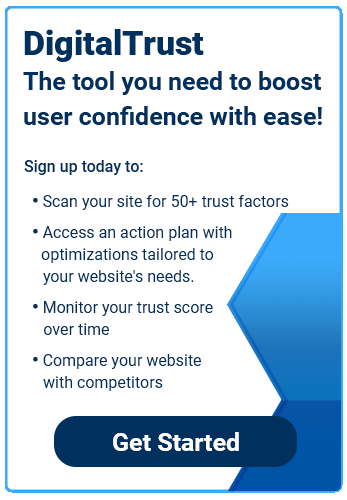In 2019, Facebook revealed that it handed out the personal information of over 87 million users. Soon after, trust in Facebook dropped by 66% and the company’s share price fell by over 24%. This situation shows the significant influence that reputation holds over consumers’ willingness to trust.
One of the easiest ways to gain users’ trust is through a sterling reputation for delivering quality products and services. Consider Amazon, long known for quick deliveries, responsive customer service, and easy returns. They can leverage that reputation to attract new customers who are looking for a trustworthy business to conveniently deliver what they want.
Here a few factors that play into developing a strong reputation:
1. Feedback/Social Proof
It’s not enough to tell customers that you deliver a great product. Users want to hear from previous customers about their experience with your business.
This need for authentic feedback has led to the explosion of review sites like Yelp, where users provide real and unvarnished reviews of their experiences. You should monitor these sites for particularly good reviews to feature on your site.
You’ll also want to feature any press your business has gathered over the years in an easy-to-find area. In addition to press, you should highlight any awards earned by your business.
People also trust longevity, hence the abundance of “Established In” messages accompanying companies’ logos. If your business has been operating for a significant amount of time, you’ll want to reference this on your site.
2. Third-Party Endorsements
There’s a reason why brands pay famous people millions to endorse their products: It works. People trust products endorsed by people they trust, as much as they might not want to admit it.
According to a study by Nielsen, 92% of buyers said that they trust referrals from people they know. Use this psychology to your advantage and include testimonials from influencers in your field.
You can also include the logos of businesses that may have used or endorsed your product in the press or on their blog.
Aside from endorsements, you should display trust badges from any services you use to keep user information secure or vouch for your business. These include:
- Safe Checkout Badges – SSL certificates indicating that your checkout process is safe and secure. Some of the most popular safe checkout badges include Symantec’s VeriSign, Shopify, Paypal, Norton, and Lifelock.
- Accepted Payment Badges – Accepted payment options, including recognized names like Visa/Mastercard, Discover, and Apple Pay.
- Organization Badges – Reputable organizations that have verified your business’s practices, such as the Better Business Bureau Accredited Business badge and the Google Trusted Store badge.

